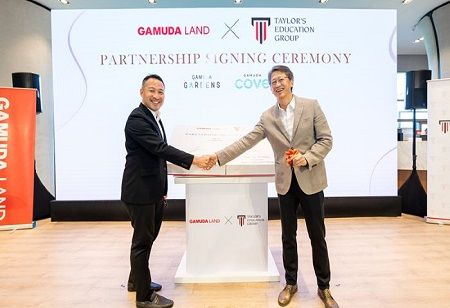-
- Taylor's Education Group integrates ESG values and embraces AI across institutions in Malaysia, Singapore, and Vietnam, aligning with student-driven sustainability priorities.
- With universities in Vietnam and Singapore, and ventures in EdTech, Taylor's promotes SDG-linked education and AI-augmented classrooms through its 'Impact Labs' model.
- In collaboration with township developers like Gamuda, Taylor’s is rolling out cost-effective international schools to meet Malaysia’s rising demand for accessible quality education.
Taylor's Education Group is spearheading Environmental, Social, and Governance (ESG) values, adopting artificial intelligence (AI) as a chance, and making quality education accessible to more people with new affordable international schools.
This all-around strategy was underscored by Karl Engkvist, President of Taylor's Education Group, in a recent interview with BusinessToday, where he shared with the newspaper the group's strategic orientations and its international perspective on education.
In spite of not being a public company and hence not being compelled to do so by regulators, Taylor's has firmly inculcated ESG programs in all of its Malaysian, Singaporean, and Vietnamese institutions. Engkvist reiterated that much of this dedication is prompted by student and employee demand, in line with rising knowledge of the younger generation regarding environmental and social effects.
"Today's students are far more interested in such impacts on the environment, on society, on transparency and the way business is conducted", Engkvist said. One of the main focuses is the 'Impact Labs' at Taylor's University, where each student is mapped to at least one UN Sustainable Development Goal (SDG) throughout their program. This allows for interdisciplinary, balanced thinking, incorporating sustainability into engineering, accounting, and all other disciplines.
Environmentally, Taylor's emphasizes concrete action in its buildings, such as solar panels, effective air conditioning, rainwater and wastewater harvesting, and waste reduction programs led by students. Its British University Vietnam campus was recently awarded the Edge Certification for its second phase of development, which received a lot of positive press. Taylor's also recently appointed a specific sustainability role, highlighting how serious it is about monitoring progress towards minimizing its carbon footprint with bold but integrity-led targets.
Engkvist, whose experience is based on US education, test preparation, and learning management systems (with a distinguished stint in China with Blackboard), shared his long years of passion for Asia's development and dedication to education. He mentioned his ten-year span of time in Asia, of which eight years have been spent with Taylor's.
Taylor's Education Group's diversification extends geographically. Outside of Malaysia, it has the British University Vietnam (BUV) in Vietnam, Nexus International School Singapore, and UK student accommodations. The group has also made astute investments in education technology venture capital and private equity funds that offer clues to how technologies such as AI, cybersecurity, big data, and cloud computing will define the future of learning. Engkvist explained that Taylor's College's development into the more extensive Taylor's Education Group with its expansion into K-12 and global operations was mostly in the period after 2000. His perspective on recent global challenges like geopolitical uncertainty and the advent of AI, as excellent opportunities for the education industry.
He posited that geopolitical tensions are triggering Malaysia, Vietnam, and Singapore to become increasingly desirable locations for transnational education, pulling international-exposure-seeking families (e.g., from China) closer to home. "The increase in our international student population at Taylor's University during the past six or seven years…is evidence of that Taylor's University has become a genuine regional university," he said. When it comes to AI, however, Engkvist is a glass-half-full kind of person, viewing it as a means to better access information and create a more level playing field, not as a risk. Whereas AI can do a great job of giving answers, humans are best at solving problems, a fundamental pillar of a liberal arts education. Taylor's is aggressively embracing AI to augment and enrich classroom instruction, hoping teachers will become coaches instead of mere content dispensers.
Maybe a more meaningful new pillar for Taylor's Education Group is its dedication to opening up access to quality education through a new breed of less expensive international schools. Engkvist clarified that this move is in response to an increasing demand from Malaysia's rising middle class.
Through partnerships with township developers such as Gamuda, who are incentivized to include quality schools within their townships in order to reduce investment costs, and taking advantage of Taylor's University's School of Education's expertise for curriculum design and professional development, the group has developed an innovative and replicable model.
This new model, different from the conventional international or private schools, seeks to combine the best aspects of different models to cater to a wider segment of Malaysian society.
🍪 Do you like Cookies?
We use cookies to ensure you get the best experience on our website. Read more...

